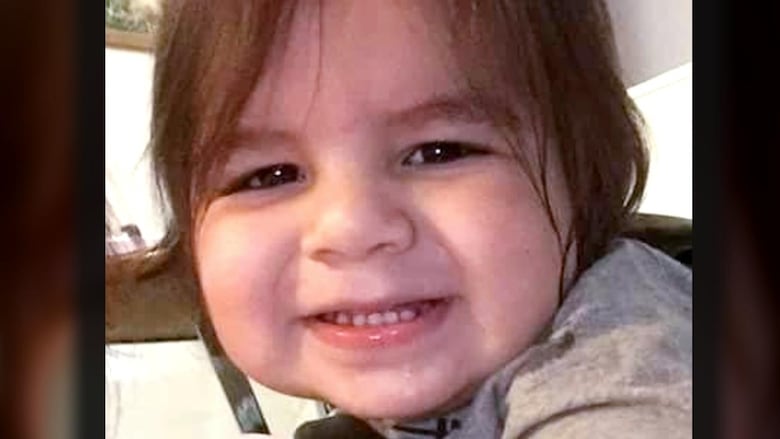4-year sentence for guardian's 'reprehensible' failure to get help for abused toddler before 2018 death
Judge called Alayna Flett's inaction when seeing evidence of abuse 'deliberate, ongoing and conscious'

WARNING: This story contains disturbing details about the abuse of a child.
A Manitoba woman has been sentenced to four years in prison in the 2018 death of her toddler cousin, who was rushed to a nursing station with evidence of severe abuse that included seven broken bones and more than 70 burns, bruises and scrapes while he was in the woman's care.
Alayna Flett was found guilty last year of failing to provide the necessaries of life as the guardian to three-year-old Abel Leveque-Flett, who was pronounced dead after being brought to the nursing station in the eastern Manitoba community of Little Grand Rapids on Aug. 23, 2018.
Court heard Abel had epilepsy, along with developmental and physical disabilities that meant he couldn't talk or walk.
When Flett was found guilty last November, the decision from provincial court Judge Stacy Cawley did not comment on who committed the abuse, but said "the only reasonable conclusion to draw in these circumstances is that Flett knew Abel was being injured from ongoing abuse but she chose not to act."
In handing down the sentence on May 15, Cawley said the only reasonable conclusion was that Flett acted out of her own self-interest when she failed to take her cousin for the medical attention he desperately needed, despite seeing evidence he was being "severely abused."
"She was protecting herself, or perhaps someone else," Cawley said, calling Flett's inaction "deliberate, ongoing and conscious."
"This is an extremely tragic case of a severely abused little boy who desperately needed protection and medical care, but his caregivers ... failed to act."
During Flett's trial, a nurse testified the child didn't have a pulse when he got to the station and had bruising on his face, broken blood vessels on his left eye and blood behind his eardrum. He also had wounds in his mouth, the nurse said.
A forensic pathologist testified the toddler's cause of death couldn't be determined, adding based on Abel's history it was likely a seizure, and that it was possible an inflicted injury could have led to one.
The pathologist said the child's dozens of injuries included multiple bruises on his head, several fractures — including four rib fractures — and unusual lesions to his neck, lower abdomen and groin region.
Houston Bushie, Flett's now husband, was also a guardian for Abel. He was sentenced to three years in prison earlier this year after pleading guilty to the same charge in connection with the toddler's death.
Court heard at Bushie's sentencing that many people were consulted about the possible cause of Abel's injuries, but with the cause of death left undetermined by the autopsy — in part because it was complicated by the toddler's seizure disorder — prosecutors were uncertain about how he died.
'She's not a negligent monster': defence
Crown attorney Sivananthan Sivarouban asked for the maximum sentence of five years in prison for Flett, given the toddler's "glaringly obvious" and "catastrophic" injuries — 75 external and five internal — and the fact that his cousin failed both to protect him from harm and to take him to a hospital once she saw he was being hurt.
"We cannot say who caused those 80 injuries except they were clearly caused by repeated abuse, and Alayna Flett knew about that abuse," Sivarouban said.
Defence lawyer Jeremy Kostiuk, who asked for a sentence between 20 months and two years less a day to be served in the community, noted Flett, now 24, was only 18 at the time of Abel's death.
Over the course of two months, she was left responsible for the care of the toddler and three of her other young relatives — and essentially told that if she didn't provide that care, they would be apprehended into the child welfare system, Kostiuk said.
"She's not a negligent monster, she's not a wretched abuser of children," he said. "She was 18, she was barely an adult, [and was] charged with the responsibility of having been given four children."
He also noted she has no criminal record and previously held jobs that included respite work and working for Jordan's Principle. She lost the latter job after her community's band council intervened because of her conviction. Court heard she was assessed as a medium risk to reoffend.
The judge said while Flett's young age and her circumstances are important, they don't reduce her culpability for Abel's suffering.
"She did not need the experience of years of adulthood to know it was reprehensible to ignore a vulnerable child in that state," Cawley said, adding that even Flett's 14-year-old brother testified he knew something was wrong and started asking questions when he saw Abel's injuries weeks before his death.
The judge gave a number of reasons why Flett's sentence was longer than Bushie's, including that Bushie pleaded guilty and was sentenced based on a limited set of facts, while Flett was convicted after a trial where Cawley made a number of factual findings.
That included concluding there was evidence Flett knew about Abel's abuse before his death and didn't stop it, which was not one of the facts agreed on in the case against her husband.
Court also heard victim impact statements filed by a nurse and a first responder who saw Abel's injuries, and a statement by his mother.
Marlene Flett said she knew what happened was bad, but said she "would never wish anything bad or death on anyone."
"My heart hurts for my baby, my niece and her husband. Yes, I'm mad," she said. "But I don't want to hate anyone, and I won't. How am I going to heal if I have this heavy heart?"